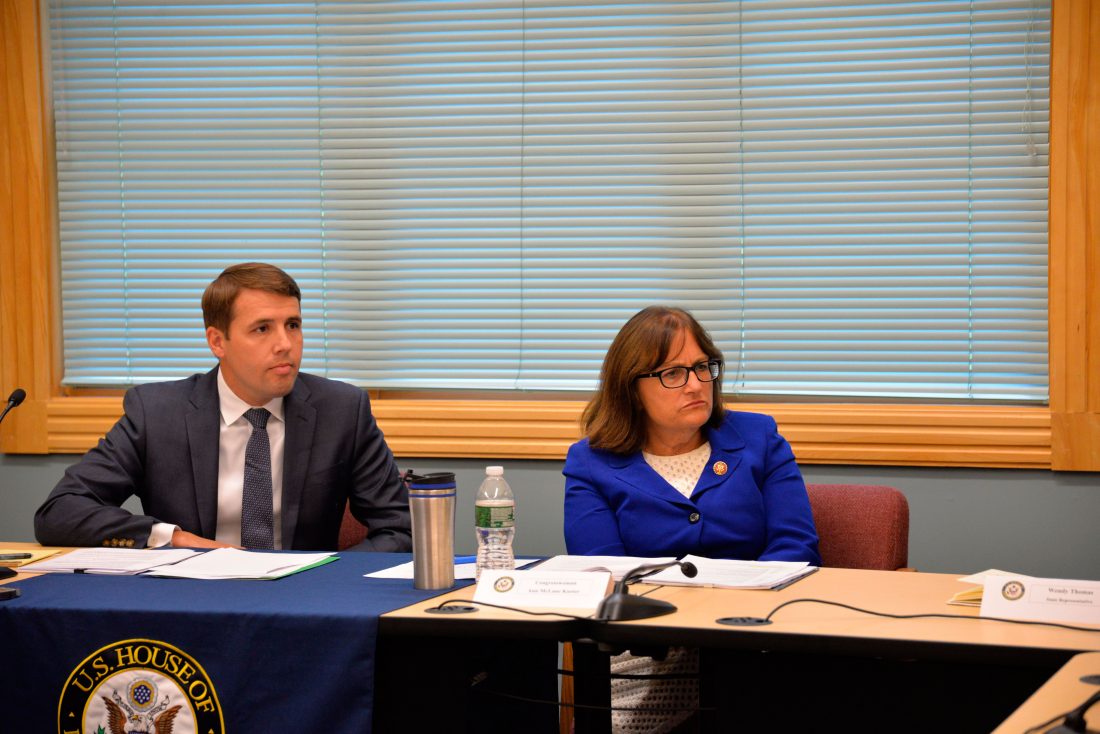PFAS still causing health and financial concerns

LITCHFIELD — New Hampshire officials recently slashed the amount of PFAS material allowed in drinking water from 70 parts per trillion to just 12 parts per trillion, but a state environmental regulator on Tuesday expressed frustration that the federal government is not helping the situation.
“We’re not supposed to be setting our own standards. That’s not what states are set up to do. That’s not what we’re funded to do and we’re not equipped to do it,” New Hampshire Department of Environmental Services Assistant Commissioner Clark Freise said during a Tuesday during a roundtable discussion on the matter at Litchfield Town Hall.
“Our real frustration is at the national level,” he added.
Freise was in luck because U.S. Reps. Annie Kuster and Chris Pappas, both D-N.H., were in attendance to address concerns of their constituents regarding PFAS. These hazardous materials are officially known as per-and polyfluoroalkyl substances, but have also become recognized as “forever chemicals” in some circles.
According to the U.S. Environmental Protection Agency, PFAS can be found in commercial household items, such as nonstick products (Teflon), cleaning products, waxes, polishes, paints and firefighting foams. The material has been identified near the Saint-Gobain Performance Plastics plant in Merrimack.
“When you talk about PFAS, these compounds are forever chemicals,” Pappas said. “They stay in your body. They stay in the environment for long periods of time, and we need to continue to study the impacts of them and make sure that additional individuals aren’t exposed here in our own state.”
Moreover, Pappas said government has a critical role to play in terms of safeguarding the environment, ensuring that the air is clean and that the water is safe to drink.
“It’s been a long period of time since the federal government did direct grants for water infrastructure,” Pappas said. “Certainly, the low-interest loans are very helpful, but ultimately, I think we need to see additional support to deal with what’s a multi-billion-dollar backlog, even here in New Hampshire.”
An Unfunded Mandate
New Hampshire Municipal Association Executive Director Margaret Byrnes said municipalities are now in a position in which they have to meet the new PFAS mandates. These standards may mean new infrastructure, new maintenance costs and ongoing upkeep. While there is a major conversation about drinking water as being the most immediate concern related to PFAS, these new standards will also impact wastewater, surface water, sludge and soil, she said.
“Municipalities and operators of public water systems are not the polluters,” Byrnes said. “They didn’t create these contaminants; they didn’t put them into the water. Taxpayers, residents, ratepayers — they’re not the polluters. They didn’t create the contaminants, and yet what we’re looking at is municipalities and their residents get to become the responsible party because they get stuck with the bill on those costs.”
She emphasized the association’s message in that the appropriate standards to keep people safe and healthy will require partnership. She said municipalities need help with financial expenses related to cleanup, infrastructure and whatever else comes along.
“Municipalities are looking at a difficult position,” Byrnes said. “They already have infrastructure needs and costs, and now they have the cost of compliance with PFAS. They want to comply, but they really need support and partnership both on the state and federal level in order to do this.”
Kuster said this is something that can definitely be worked on with cities and towns. While thinking off the top of her head, she said a notable resource available for smaller towns, meaning any municipality under 30,000 in population, is U.S. Department of Agriculture Rural Development funding. She said these dollars are frequently used for water pollution control, wastewater treatment and drinking water upgrades.
Federal Response
Kuster said she and Pappas introduced bills that will become part of a package in her committee, the House Committee on Energy and Commerce, which is where these bills come through their environmental subcommittee. She expects that to happen this fall. One of those initiatives in addressing this contamination includes designating PFAS as a hazardous substance eligible for EPA Superfund cleanup. That would give communities more resources needed for such cleanups. Another is to require blood testing for PFAS among military firefighters, especially since these chemicals have been used in the foam for fire suppression.
“When we saw the map of where this PFAS contamination is, because it was so widely used in military bases, it’s literally all across the country,” Kuster said. “So, part of our role is educating our colleagues who may not know yet what this is, but we know it’s in their communities and they just don’t have the activism of the people around this table to wake them up.”
Another bill Kuster highlighted is to establish a registry of individuals exposed to PFAS in military installations. Another bill will be to fund medical services for military service personnel and their families. She said there will be a bill regarding the manufacturing of processing notices for PFAS to add a section on the chemical substances notification as to what these chemicals are and what is now known as far as risks go. With a number of bills being worked on in a bipartisan way, Kuster is hopeful that they will be pushed to the house floor this fall.
“I believe strongly, whether the polluter is some industrial facility — like we see here in New Hampshire — or the U.S. military, ultimately, they should bear the responsibility of cleanup, paying for safe water hookups for residents and ensuring that the taxpayers aren’t footing the bill for this,” Pappas added.
Adam Urquhart may be contacted at 594-1206, or at aurquhart@nashuatelegraph.com.



